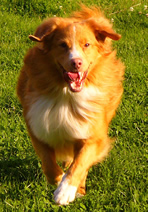
The Nova Scotia Duck Tolling Retriever was developed in Nova Scotia in the
early 19th Century and is estimated to be a cross of Golden, Chesapeake Bay
Retriever, Labrador Retriever, and Flat-Coated Retriever with a dash of Cocker
Spaniel and Irish Setter (for the brilliant red color), as well as small farm
collies and spitzes. This medium sized, powerful, compact, balanced dog is
the smallest of the retrievers. Many Tollers have a slightly sad or worried
expression when they are not working, but generally, they are alert, determined,
and quick, with a keen desire to work and please. The Toller’s attitude
and bearing suggest strength with a high degree of agility. The Toller's strong
retrieving desire coupled with his love of water, endurance and intense birdiness,
is essential for his role as a tolling retriever.
Life Expectancy:
13-15 years
Energy Level:
Gentle and affectionate..
Living Conditions:
Flexible and robust.
Barking:
Average.
Exercise Needs:
30 minutes of outdoor activity.
Breed Group:
Sporting
Size:
Medium
Height:
17 to 20 inches
Weight:
35 to 50 pounds
Standard Hair Colors:
Any shade of red, ranging from a golden red through dark coppery red
National breed club:
Nova Scotia Duck Tolling Retriever Club
The Nova Scotia Duck Tolling Retriever (Toller) was developed in the early 19th century to toll, lure, and retrieve waterfowl. "Tolling" refers to the old hunting style of drawing ducks and other waterfowl towards the hunter in the style of a fox (alternating between baiting and hiding). A Toller runs, jumps, and plays along the shoreline in full view of a flock of ducks, occasionally disappearing from sight and then quickly reappearing, aided by the hunter, who throws small sticks or a ball for the dog. The dog's playful actions arouse the curiosity of the ducks swimming offshore and they are lured within gunshot range. The Toller is subsequently sent out to retrieve the dead or wounded birds. Today the Toller is multi-faceted. You get the ideal dog...a retriever, a hunter, a loyal watchdog, a show dog (obedience or conformation) and a wonderful loving pet all rolled into one.
The Toller is highly intelligent, alert, outgoing, and ready for action. He is gentle with children and is affectionate and loving with family members. With strangers, adult Tollers generally are somewhat leery at first, especially if the owner is distant. They will work well with a happy, gentle hand most times. However, when they feel the owner is outgoing and friendly with people, they too show a great deal of friendliness to people. There should be no sign of aggressiveness in a general situation with people or with other animals.
Tollers are active dogs and they need something to keep them busy. Always wanting you to throw things at them, this is not a dog who is content sitting around all the time. The ideal family for Toller is one who likes to do a lot of camping, hiking or taking trips to the lake, a family that is going to give enough outlets for the dog’s energy.
Tollers live in all weather conditions, be it the very southern, humid atmosphere, the desert areas or heavy winter areas. Tollers live in cities and out in the country. Tollers and owners learn to adapt.
The Toller was bred to retrieve from icy waters and has a water-repellant double coat of medium length and softness with softer dense undercoat. The coat may have a slight wave on the back, but is otherwise straight. Some winter coats may form a long loose curl at the throat. Featherings are soft at the throat, behind the ears, and at the back of the thighs, and forelegs are moderately feathered.
Tollers are not plagued with many of the genetic problems present in other popular retriever breeds. Presently, breeders are working to keep dysplasia and eye problems to a minimum. Other health issues include autoimmune problems, hypothyroidism, hip dysplasia and some epilepsy.
...you may also like the Golden Retriever or a Labrador. Both have the same red coat color, and possess the same characteristics-active and always wanting to keep busy. People often remark that the Toller is the smaller version of the Retriever. However, those who are looking for a small version of a Golden or Lab in ob/field or hunting work will find a major difference in the personalities of the breeds. Tollers have a "spark."

Copyright © 2005-2016 Pet Information All Rights Reserved
Contact us: www162date@outlook.com